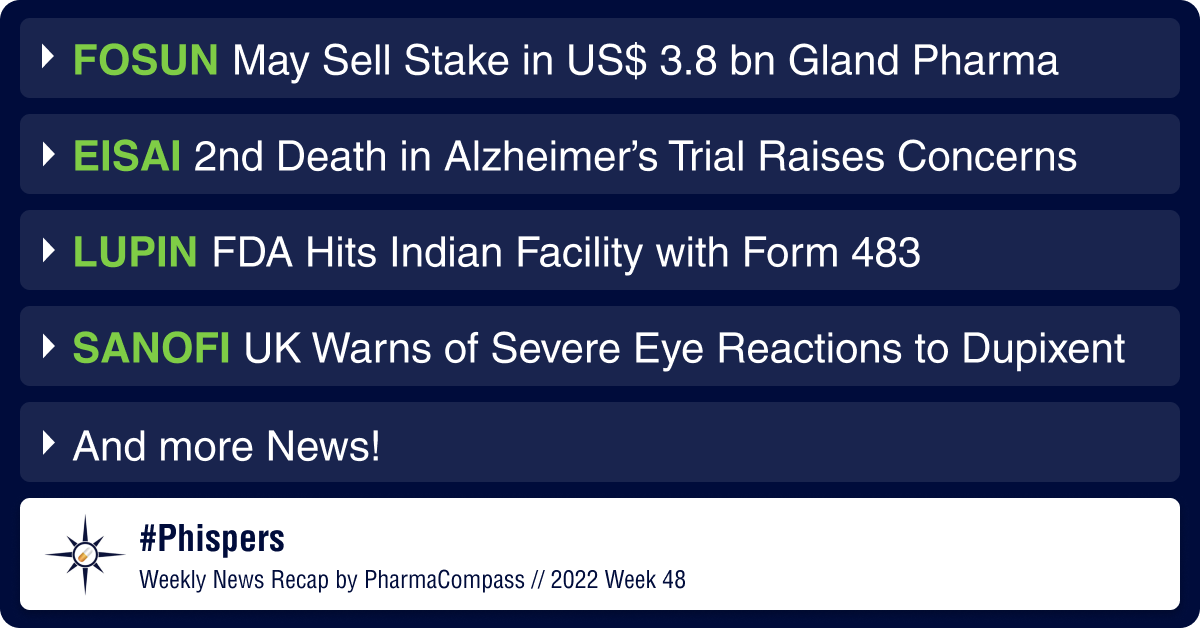
By PharmaCompass
2022-12-01
Impressions: 2,357 Article
Even as Eisai published new data that shows lecanemab’s benefit in slowing the progress of Alzheimer’s disease, a second potential treatment-related death has raised questions about the side effects of the treatment. Eisai plans to seek full approval of the drug sometime next year. In another late-stage Alzheimer’s disease trial, Axsome Therapeutics’ Auvelity (AXS-05) scored positive results. Roche, on the other hand, is calling off most trials of its own Alzheimer’s drug — gantenerumab.
This week’s Phispers also brings you news that China’s Shanghai Fosun Pharmaceutical Group is planning to sell its controlling stake in Indian drugmaker Gland Pharma after receiving interest from potential buyers.
In M&A news, AstraZeneca is acquiring Netherlands-based targeted cancer therapy developer, Neogene Therapeutics, for up to US$ 320 million to build its pipeline of cell-based cancer treatments. The Anglo-Swedish drugmaker has also inked a potential US$ 402 million licensing deal with British drug discovery firm C4X Discovery Holdings (C4XD) to develop an oral treatment for chronic obstructive pulmonary disease (COPD).
In regulatory news, the US Food and Drug Administration (FDA) has issued a Form 483 with eight observations each to Indian drugmaker Lupin’s drug product facility and API facility at Mandideep in the Indian state of Madhya Pradesh.
In approvals, Bayer’s Nubeqa, in combination with androgen deprivation therapy (ADT) and the chemotherapy docetaxel, has received a go-ahead in the UK to treat patients with metastatic hormone-sensitive prostate cancer (mHSPC). Meanwhile, the UK health regulator has warned that the use of Sanofi and Regeneron’s blockbuster drug Dupixent (dupilumab) may lead to some new and serious eye-related side effects.
The FDA has granted an accelerated review to Sarepta’ investigational gene therapy to treat Duchenne muscular dystrophy (DMD) – SRP-9001. Roche has voluntarily withdrawn a US indication of its monoclonal antibody Tecentriq (atezolizumab) as a treatment for adults with a form of bladder cancer. And Spectrum is laying off 75 percent of its R&D workforce after FDA rejected its lung cancer drug.
Death of second patient on Eisai-Biogen’s Alzheimer’s drug raises safety concerns
Finding a treatment for Alzheimer’s disease has been the Holy Grail of the pharmaceutical industry. But this brain-wasting disease continues to haunt drugmakers as they keep stumbling along the path to find a cure.
In September, Eisai and partner Biogen had announced encouraging results from a late-stage trial of an experimental Alzheimer’s drug – lecanemab. Since then, reports of two potential treatment-related deaths have taken the initial sheen out of the drug’s success.
This week, a report published by journal Science.org said a woman on lecanemab has died from a brain hemorrhage. This is the second such death reported in as many months. In October, health journal STAT reported that an octogenarian man who received the drug had died in June.
Eisai said it doesn’t believe either death can be pinned on lecanemab. The drugmaker has published new data showing that the drug succeeded in slowing down the progress of the brain-wasting disease. However, the drug has been linked to a side effect known as amyloid-related imaging abnormalities (ARIA), i.e. abnormalities that appear in MRI imaging and can indicate brain swelling or hemorrhage.
Meanwhile, the Japanese drugmaker plans to seek full approval of lecanemab in the US, Europe and Japan sometime next year, Reuters has said.
Axsome’s depression drug eases Alzheimer’s symptoms: In August, the FDA had approved Axsome Therapeutics’ Auvelity (AXS-05) as the first rapid-acting oral treatment for adults with major depressive disorder (MDD). Now, the same drug has scored positive results in a late-stage clinical trial testing it in patients with Alzheimer’s disease agitation.
The drug – a combination of dextromethorphan and bupropion – hit both the primary and secondary endpoints, performing significantly better than a placebo at both delaying and preventing the recurrence of agitation.
Roche closes trials for its Alzheimer’s drug: Roche is closing down most trials of gantenerumab, its experimental Alzheimer’s drug, as it has failed to slow advancement of the disease in late-stage studies. Roche presented full results of twin trials at an Alzheimer’s meeting in San Francisco after announcing in November that the drug had failed in the two trials.
Fosun weighs sale of controlling stake in US$ 3.8 billion Gland Pharma
Gland Pharma might be up for sale soon, but the US$ 3.8 billion Indian drugmaker is still in the dark about it. China’s Shanghai Fosun Pharmaceutical Group is planning a sale of its controlling stake in the company after receiving interest from potential buyers, Bloomberg News has reported.
Fosun, which bought a 74 percent stake in Gland Pharma for US$ 1.1 billion in 2017, is working with an adviser to “gauge interest” in its controlling stake in Gland. The debt-ridden parent company of Fosun Pharma – Fosun International – has made several stake reductions and sales this year.
Meanwhile, the Indian drugmaker said it is not aware that Fosun Pharma is considering the sale of its shares. This week, Gland announced it is buying privately held French contract development and manufacturing firm Cenexi for €120 million (US$ 124.3 million) to expand its presence in European markets.
Astra to buy cancer therapy developer Neogene; inks deal with C4XD for COPD
AstraZeneca is acquiring Netherlands-based targeted cancer therapy developer, Neogene Therapeutics, for up to US$ 320 million in a bid to build its pipeline of cell-based cancer treatments. AstraZeneca will pay US$ 200 million to Neogene and has promised another US$ 120 million to the latter if it meets certain targets. The deal is expected to close in the first quarter of 2023.
AstraZeneca has also inked a potential US$ 402 million licensing deal with British drug discovery firm C4X Discovery Holdings (C4XD) to develop an oral treatment for chronic obstructive pulmonary disease (COPD) along with other inflammatory and respiratory illnesses. The partners will focus on developing C4XD’s NRF2 Activator program with a focus on COPD. C4XD will receive US$ 16 million in upfront and pre-clinical payments, and another US$ 385.8 million in milestones and royalties.
In a separate move, AstraZeneca is selling its facility in West Chester, Ohio, to bio-manufacturing firm National Resilience. The drugmakers have inked a “long-term” bio-manufacturing deal under which Resilience will continue to manufacture select AstraZeneca medicines. More than 500 employees who work at the facility will retain their jobs. The companies expect to close the deal in early 2023.
Japanese approval for Enhertu: AstraZeneca and partner Daiichi Sankyo have received full approval in Japan for its blockbuster drug Enhertu (trastuzumab deruxtecan) as a treatment for certain adults with HER2 positive unresectable or recurrent breast cancer following prior chemotherapy, which includes trastuzumab and a taxane (a type of drug that blocks cell growth by stopping cell division). The nod is based on results from a phase 3 study where the drug showed a 72 percent reduction in the risk of disease progression or death when compared to Roche’s Kadcyla.
FDA issues Form 483 with eight observations each to Lupin’s drug product and API facility
The FDA has issued a Form 483 with eight observations each to Indian drugmaker Lupin’s drug product facility and API facility at Mandideep. The agency had inspected Lupin’s Mandideep Unit-1 site in the Indian state of Madhya Pradesh from November 14 to 23, 2022. The Mumbai-based drugmaker said it does not believe that the Form 483 will disrupt supplies or impact the existing revenues from operations of the facility.
FDA grants accelerated review to Roche-Sarepta’s billion-dollar DMD drug
Back in 2019, Roche had paid US$ 1.15 billion upfront to buy ex-US rights to Sarepta’s investigational gene therapy to treat Duchenne muscular dystrophy (DMD) – SRP-9001. Its investment is now one step closer to being fruitful.
The FDA has granted an accelerated review to the drug. The biologic license application (BLA) submitted to the agency is supported by data from three studies, where the drug has demonstrated positive efficacy at various time points up to four years after treatment. DMD is a rare degenerative neuromuscular disorder that causes severe progressive muscle loss and premature death. If approved, SRP-9001 will be the biotech’s fourth drug to treat DMD.
Bayer’s Nubeqa-ADT-chemo combo bags UK nod in prostate cancer: Bayer’s Nubeqa, in combination with androgen deprivation therapy (ADT) and the chemotherapy docetaxel, has received a go-ahead in the UK to treat patients with metastatic hormone-sensitive prostate cancer (mHSPC).
This is the first prostate cancer treatment to be made available by the NHS through an early national access agreement. Nubeqa is already available with the NHS for patients with localized prostate cancer. Bayer plans to “immediately” roll out the treatment in the UK.
Regeneron’s Evkeeza bags FDA’s priority review for use in kids: Regeneron has bagged FDA’s priority review status for use in children aged five to 11 years with the ultra-rare genetic disorder homozygous familial hypercholesterolemia (HoFH). The action date is March 30, 2023. If approved, Evkeeza would become the first drug to treat kids (under age 10) with the condition.
GSK shares more data on Jemperli versus Keytruda trial: Last month, GSK had said its oncology drug Jemperli (dostarlimab) has matched up to Merck’s Keytruda at shrinking non-small cell lung cancer (NSCLC) in a phase 2 trial. This week, GSK has more data to share. When used in combination with chemotherapy, Jemperli shrank tumors in 46 percent of newly diagnosed patients with metastatic non-squamous NSCLC (as compared to 37 percent of patients for Keytruda’s chemo combo arm). Two out of 121 patients who took Jemperli saw their tumors eradicated completely (as opposed to three of 122 patients in the Keytruda arm).
MHRA warns of severe eye reactions in patients using Sanofi-Regeneron’s Dupixent
The UK health regulator has warned that the use of Sanofi and Regeneron’s blockbuster dermatitis and asthma drug Dupixent (dupilumab) may lead to some new and serious eye-related side effects. The Medicines and Healthcare Regulatory Agency (MHRA) said any new or worsening reactions in patients’ eyes due to the use of Dupixent should be immediately examined by healthcare professionals. The agency, however, added that most ocular reactions to the dermatitis and asthma drug are mild and can be managed.
UK drug regulator calls Pfizer CEO’s claims misleading: Last year, Pfizer CEO Albert Bourla had said in an interview that he had no doubt about the benefits of the company’s then-unapproved Covid-19 vaccine in five- to 11-year-olds. Almost a year later, UK’s Prescription Medicines Code of Practice Authority (PMCPA) has branded those claims as “misleading” and “overly promotional.” The regulator was acting on a complaint filed by children’s advocacy group, UsForThem. PMCPA said Pfizer had breached the rules, including by misleading the public, making unsubstantiated claims and by failing to present information in a factual and balanced way.
Roche withdraws Tecentriq for bladder cancer indication in US
Roche has voluntarily withdrawn a US indication of its monoclonal antibody Tecentriq (atezolizumab) as a treatment for adults with a form of bladder cancer. Roche’s unit Genentech said it took the decision after the drug failed a confirmatory trial that aimed to convert the drug’s accelerated approval to a regular approval for the indication.
The late-stage trial was designed to evaluate Tecentriq plus platinum-based chemotherapy for the first-line treatment of people with previously untreated advanced bladder cancer. The decision does not affect other approved indications for Tecentriq in the US market, the drugmaker said.
BMS to terminate cardiovascular gene therapy deal with uniQure: Bristol Myers Squibb is backing out of a seven-year-old collaboration with Amsterdam-based uniQure to develop gene therapies against multiple cardiovascular disease targets. The collaboration, which was first inked in 2015 and then amended in 2020, will expire in February next year. BMS had paid US$ 50 million upfront in 2015.
Spectrum lays off 75 percent of its R&D workforce after FDA rejects lung cancer drug
The FDA has refused to approve Spectrum Pharmaceuticals’ experimental lung cancer drug due to inadequate data. Following the rejection, Spectrum said it will lay off 75 percent of its research and development workforce.
The Nevada-based company said it will no longer focus on developing the drug – Pozenveo (poziotinib) – as a treatment for NSCLC with a rare genetic mutation, which affects two to four percent of cancer patients. Instead, it plans to explore strategic alternatives for it, like partnerships with other drugmakers, and focus on its other cancer drug — Rolvedon.The PharmaCompass Newsletter – Sign Up, Stay Ahead
Feedback, help us to improve. Click here
Image Credit : Phisper Infographic by SCORR MARKETING & PharmaCompass license under CC BY 2.0
“ The article is based on the information available in public and which the author believes to be true. The author is not disseminating any information, which the author believes or knows, is confidential or in conflict with the privacy of any person. The views expressed or information supplied through this article is mere opinion and observation of the author. The author does not intend to defame, insult or, cause loss or damage to anyone, in any manner, through this article.”








